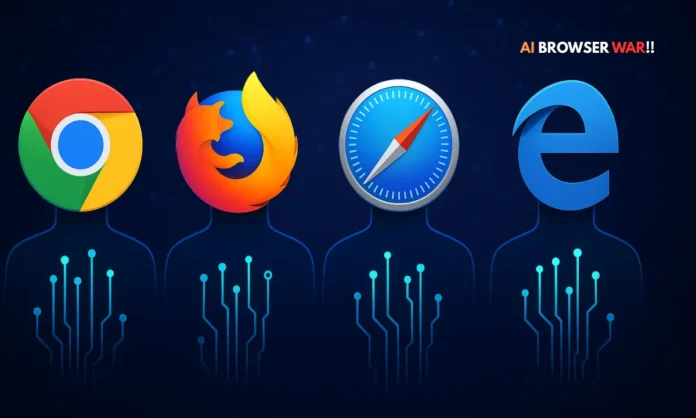SUMMARY
- Opera Neon, Dia, and Comet are reinventing browsers with AI-native capabilities
- Google is embedding Gemini deeper into Chrome, but struggles to match startup agility
- The future of the internet hinges on how browsers evolve beyond simple tabs and search
From Tabs to Agents: Why 2025 Is a Browser Turning Point
There was a time when the browser you chose was a matter of taste. Chrome was dominant, Firefox had ethics, Safari was for purists, and Internet Explorer was a meme. But in 2025, that landscape is obsolete. We’ve entered a phase where browsers no longer just render pages—they think, assist, and even act on your behalf. The new war isn’t over speed or security. It’s about AI.
Artificial intelligence isn’t merely a feature anymore—it’s the spine of a new browsing paradigm. This shift isn’t theoretical: it’s being built in real time by newcomers like Opera’s Neon, Perplexity’s Comet, and the Arc-succeeding Dia. And while Google Chrome still commands two-thirds of the global market, the question now is whether it can retain that dominance in a world where browsing becomes a dialogue, not just a display.
Google has a new button. It might destroy the web
— Thomas Germain (@thomasgermain) June 16, 2025
Experts say the new “AI Mode” is an asteroid aimed at the heart of the internet, one that will decimate millions of websites. It seems this chapter of online history is finally over. Here’s what comes next https://t.co/H5X2EwRf8f
Neon, Dia, and Comet: The AI-Native Challengers
- Opera Neon brands itself as a browser for the “agentic web”
- Dia (Arc successor) introduces AI-powered tabs with memory and semantic understanding
- Comet promises policy-grade, multi-domain research answers directly in the address bar
Opera Neon has redefined ambition. Its “Make” feature builds apps using cloud-based virtual machines, and “Do” automates web tasks like bookings and navigation. Meanwhile, “Chat” adds persistent, multilingual AI conversations.
Dia takes the baton further. Each tab is its own agent, capable of interacting across pages—making research feel like a collaborative Zoom call. The idea is revolutionary: less browsing, more orchestrating knowledge.
Comet, still unreleased, is built by Perplexity AI and claims to turn search into a reasoning engine. It won’t just link—it’ll synthesize across domains, cite, and explain. If it delivers, it may disrupt the last browser monopolies standing.
Google’s Gemini Play: Power Meets Conservatism
- Gemini integration expands across Chrome’s interface and ecosystem
- New features include AI writing help, tab grouping, and contextual summarization
- But Chrome’s scale limits its capacity for radical change
To counter the newcomers, Google is embedding Gemini, its flagship AI, deeper into Chrome. The “Help me write” tool is now visible in Docs, Gmail, and Chrome sidebars. Chrome users can ask contextual questions like “what’s the TL;DR of this page?” and get inline Gemini-powered answers. Google is also testing live previews, smart tab groups, and even conversational command lines.
Yet Google’s strength is also its anchor. It can’t risk user alienation or break compatibility with enterprise stacks. This limits how bold Chrome can be. Startups can afford chaotic innovation. Google? Not so much. Still, the stakes are too high for complacency—because Chrome isn’t just a browser, it’s the door to Search, Gmail, Ads, Android, and everything else.
The Browser as Battleground: What’s at Stake for the Internet?
- Browser choice now shapes workflows, not just page rendering
- Losing power users could erode Google’s ecosystem far beyond Chrome
- Startups are turning browsers into productivity and intelligence hubs
The AI-native browsers don’t need to dethrone Chrome to cause damage. If just 5% of researchers, developers, or creators switch to more interactive alternatives, Google’s entire ecosystem starts to wobble. That’s why Gemini is being hardwired across Android, Drive, Calendar, and more.
Chrome still has scale and trust. But Neon, Dia, and Comet offer vision. In 2025, the question is no longer “which browser is fastest?” It’s “which browser thinks with me?” And the answer may no longer be Google.
New Kingmakers of the Web?
We’re witnessing a foundational reshaping of how people access and interact with the internet. Browsers, once passive interfaces, are evolving into intelligent agents. In this new regime, memory, autonomy, and semantic understanding may matter more than rendering benchmarks.
Google Chrome still reigns. But as these nimble AI challengers redefine what a browser can be, the age of passive internet consumption may end. And if Chrome wants to stay relevant, it must decide whether it can disrupt itself before someone else does.


